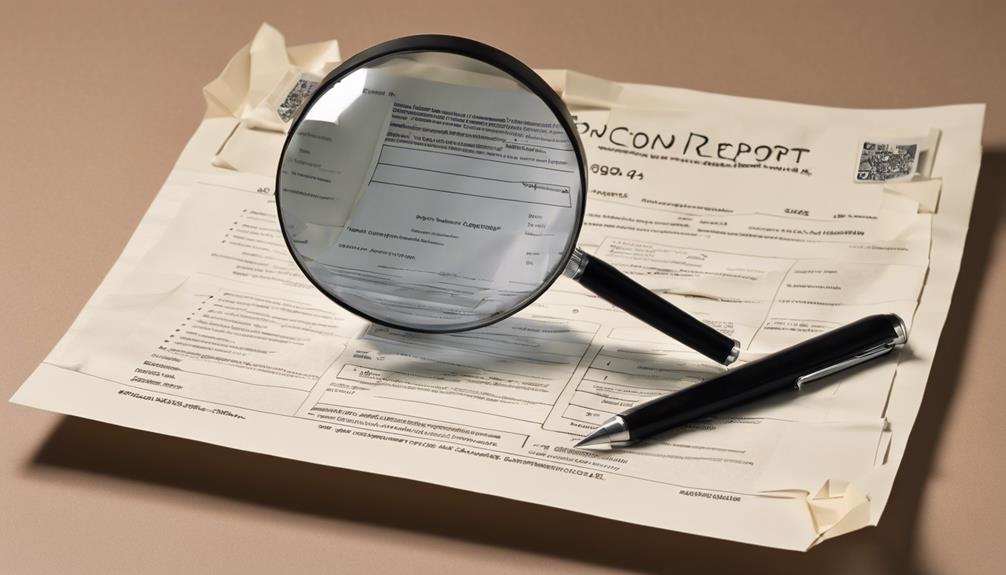Warrants can appear on background checks, shedding light on an individual's legal background. Different types of warrants, like arrest, bench, civil, traffic, and fugitive warrants, reveal various aspects of legal involvement. Criminal warrants feature prominently in background checks, disclosing ongoing legal actions. Employers consider warrants, especially criminal and bench warrants, when evaluating candidates. Understanding the distinctions between warrant types is vital for interpreting background check results accurately. Knowing how warrants can impact one's history is essential for making informed decisions. Further information on the topic can provide a more thorough understanding of warrant implications.
Key Takeaways
- Bench warrants for court no-shows commonly appear on background checks.
- Criminal warrants, like arrest warrants, are often included in background checks.
- Civil warrants may or may not show up, depending on the type of background check.
- Traffic warrants for unpaid fines or court appearances can be visible on background checks.
- In-depth background checks may reveal a variety of warrants, including search warrants.
Types of Warrants
Arrest warrants are issued based on probable cause for suspected crimes, allowing law enforcement to detain individuals. Various types of warrants exist, each serving different purposes in the legal system.
Bench warrants are issued when individuals fail to appear in court as required. Civil warrants are related to violating court orders in civil cases, while traffic warrants are issued for failing to pay fines or attend court for traffic violations. Capias Pro Fine warrants are specifically for individuals who haven't paid court-ordered fines.
When conducting a criminal background check, these warrants can show up, signaling legal issues that may need to be addressed. Understanding the different types of warrants is essential for individuals to navigate the complexities of the legal system and ensure compliance with court orders and obligations.
Being aware of the implications of these warrants on background checks can help individuals take the necessary steps to resolve any outstanding legal matters.
Bench Warrants

Bench warrants are court-issued orders that are typically a result of failing to appear in court or comply with court orders. When included in background checks, these warrants can have serious implications, affecting job opportunities and legal matters for individuals.
Resolving bench warrants often involves appearing in court to address the underlying issues and comply with the judge's orders.
Bench Warrants Defined
Issued by judges for various legal reasons, bench warrants signal the importance for an individual's presence in court. Here are some key points to understand bench warrants:
- Legal Basis: Bench warrants are typically issued due to reasons like failure to appear in court or not following court orders.
- Relevance to Legal Cases: These warrants are directly related to ongoing legal cases and serve as a way to guarantee the individual attends court proceedings.
- Potential Consequences: If encountered by law enforcement, bench warrants can lead to the individual's arrest.
- Background Check Visibility: Bench warrants may appear on background checks that include court records, although their visibility can vary depending on the depth of the search.
Understanding the nature and implications of bench warrants is essential, especially when considering their potential impact on legal matters and background checks.
Impact on Background Checks
How do bench warrants affect the outcomes of background checks for individuals?
Bench warrants, often issued for failure to appear in court or non-compliance with legal obligations, can have implications on job opportunities when they appear in thorough background checks. These warrants signify unresolved issues with the legal system, potentially raising concerns for employers regarding an individual's reliability and trustworthiness.
The impact of bench warrants on background checks varies based on the detailed search conducted by the employer or screening agency. The visibility of these warrants depends on the accessibility to court records within the relevant jurisdiction. Individuals with bench warrants in their records may face challenges in securing employment, particularly if the warrants are recent or indicative of ongoing legal issues.
Addressing and resolving bench warrants promptly is important for individuals seeking to improve their background check results and increase their chances of securing job opportunities.
Resolving Bench Warrants
Resolving bench warrants promptly is essential for individuals aiming to address potential legal issues and improve their background check results. When faced with a bench warrant, taking prompt action is vital to avoid legal consequences.
Here are steps to contemplate for resolving warrants:
- Appear in Court: Showing up in court is necessary to address the underlying issue that led to the bench warrant.
- Understand the Bench Warrant: Review the details of the warrant to comprehend the specific reasons behind it.
- Seek Legal Assistance: Consulting with a lawyer can provide guidance on the best course of action for resolving the warrant.
- Update Criminal Record: Once the warrant is resolved, make sure that the criminal record is updated to reflect the case's closure.
Criminal Warrants

Criminal warrants play an essential role in background checks as they reveal legal actions taken against individuals suspected of criminal activities. These warrants, including arrest warrants and search warrants, are key components of criminal background checks, providing information about any ongoing legal proceedings.
When conducting standard background checks, these warrants may appear if the individual is involved in court actions related to criminal activities. The visibility of criminal warrants can vary depending on the type of background check and the jurisdiction where the warrant was issued.
Employers often consider the presence of criminal warrants when evaluating a candidate's suitability for a position, as it can shed light on the individual's legal history. Understanding the implications of criminal warrants on background checks is crucial for both employers and candidates to make informed decisions regarding employment opportunities and legal obligations.
Civil Warrants

Civil warrants, issued for non-compliance with court orders, are distinct from criminal warrants and typically stem from civil court proceedings. When it comes to background checks, the visibility of civil warrants can vary based on the type of check conducted.
Here are some key points to take into account regarding civil warrants on background checks:
- Nature: Civil warrants are related to non-criminal matters like failure to pay child support.
- Origin: They arise from civil court proceedings rather than criminal cases.
- Inclusion: Civil warrants may appear on specific background checks that focus on civil history.
- Exclusion: Standard criminal background checks usually don't contain information about civil warrants.
Understanding the distinction between criminal and civil warrants is important when evaluating what might show up on a background check.
For individuals with civil warrants, it's essential to be mindful of how these warrants may impact their background check results based on the type of check being conducted.
Traffic Warrants

Traffic warrants are typically issued for unpaid tickets or failure to appear in court for traffic violations. These warrants are categorized as bench warrants related to traffic offenses and can vary in visibility on background checks.
Understanding the implications of traffic warrants and how to resolve them is essential for individuals facing these legal issues.
Traffic Warrant Implications
Implications stemming from outstanding traffic warrants can range from license suspension to potential arrest, underscoring the importance of addressing these issues promptly.
When it comes to traffic warrants, several key points need consideration:
- License Suspension: Failure to address traffic warrants can result in the suspension of one's driver's license, leading to significant inconveniences.
- Potential Arrest: If a bench warrant is issued due to unresolved traffic violations, individuals may face the risk of arrest by law enforcement authorities.
- Appearance on Background Checks: While not always included in standard background checks, traffic warrants are part of one's legal history and may surface in certain screenings, like those conducted by a potential employer.
- Resolving the Issue: Seeking legal advice and taking steps to pay fines or appear in court promptly is essential to avoid escalating consequences related to traffic warrants.
Resolving Traffic Warrants
When facing unresolved traffic warrants, individuals must take prompt action to avoid escalating legal consequences. Traffic warrants are often issued for unpaid tickets or failing to appear in court for traffic violations. These warrants, known as bench warrants, can lead to arrest if not addressed promptly.
Resolving traffic warrants typically involves paying fines, attending court hearings, or arranging alternatives like community service. Ignoring these warrants may result in increased fines, license suspension, or even a bench warrant for arrest. Seeking assistance from a criminal defense attorney can provide guidance on maneuvering the process.
Pro Fine Warrants, which involve civil penalties for traffic violations, are essential to address to prevent further complications. By taking steps to resolve traffic warrants swiftly, individuals can prevent adverse impacts on their driving privileges and legal records. Remember, addressing these warrants promptly is crucial to avoid future issues.
Fugitive Warrants

Fugitive warrants are issued to apprehend individuals who've fled across state lines to avoid facing justice. When it comes to background checks, certain roles necessitate thorough screenings to uncover important information like fugitive warrants. Here is how these warrants impact the process:
- Standard Background Checks: These may not always reveal fugitive warrants from other states, potentially leaving gaps in evaluating an individual's criminal behavior.
- National Background Checks: They can expose fugitive warrants, triggering the need for more detailed state-specific searches to guarantee a thorough review.
- Hiring Decisions: For positions requiring a meticulous background check, such as in law enforcement, the presence of a fugitive warrant could greatly influence the hiring process from a legal standpoint.
- Felony Cases: Fugitive warrants are particularly relevant in felony cases, emphasizing the importance of conducting thorough background checks to reveal any attempts to evade justice.
Search Warrants

Search warrants are legal documents that grant law enforcement the authority to search specific locations for evidence. These court-issued warrants are obtained by law enforcement officers after demonstrating probable cause to a judge or magistrate.
In standard background checks, search warrants may not always be included unless they've been executed. The visibility of search warrants on background checks can vary depending on the level of detail specified in the search criteria.
For more thorough background checks, employers may choose to include search warrants in their search parameters to guarantee a more in-depth examination of an individual's legal history. Including search warrants in the search parameters can provide a more detailed overview of any involvement individuals may have had in legal investigations.
As a result, for a more detailed background check, the consideration of search warrants can offer a deeper insight into an individual's legal interactions and activities.
Employment Background Checks

Employers conducting employment background checks may include information on warrants based on the type of warrant and the level of thoroughness of the check.
When considering warrants on employment background checks, the following points are important:
- Bench warrants: These are more likely to be revealed on background checks, especially if related to failure to appear in court.
- Criminal warrants: Such as arrest warrants may appear, particularly for roles with heightened security concerns.
- Civil warrants: Including those for unpaid fines, could also be part of the background screening process.
- Traffic warrants: Issued for unpaid tickets, may or may not show up on standard employment background checks.
Employers often consider the nature of the warrant and the relevance to the job position when interpreting this information.
Understanding the presence of warrants in employment background checks is vital for both employers and job seekers to navigate the hiring process effectively and secure a good fit for the role.
Frequently Asked Questions
Do Warrants Show up on Background Checks in California?
Warrants in California, including bench, criminal, civil, and traffic warrants, can appear on background checks. The visibility of warrants on background checks in the state varies based on the type of warrant and the depth of the background check.
How Long Do Warrants Last in Indiana?
In Indiana, warrants can endure indefinitely until resolved by the court. Bench warrants for court no-shows persist until the individual is found. Arrest warrants for crimes remain until apprehension. Search warrants have variable durations.
How Long Do Warrants Last in Michigan?
In Michigan, warrants can last indefinitely until resolved or recalled by the issuing court. Bench warrants for court no-shows remain active until appearance. Arrest warrants stay until apprehension. Civil warrants for unpaid fines last until paid.
How Long Do Warrants Last in Tennessee?
Warrants in Tennessee can have indefinite durations until resolved by the court or canceled. Bench warrants for court no-shows stay active until addressed. Arrest warrants remain until the individual is caught or surrenders. Some warrants have specific deadlines.
What Information About Warrants Will Show Up on a Background Check?
When conducting background checks for warrants information, you can expect to find details such as the type of warrant, issuing agency, and the charges filed. Additionally, information about the status of the warrant, including whether it’s active or resolved, will also be included in the report.
Conclusion
To sum up, warrants do show up on background checks, including:
- Bench warrants
- Criminal warrants
- Civil warrants
- Traffic warrants
- Fugitive warrants
- Search warrants
According to a study by HireRight, a leading provider of employment background checks, an estimated 10% of background checks reveal the presence of warrants.
It's important to address any warrants on your record to avoid potential legal issues and negative consequences in your personal and professional life.









